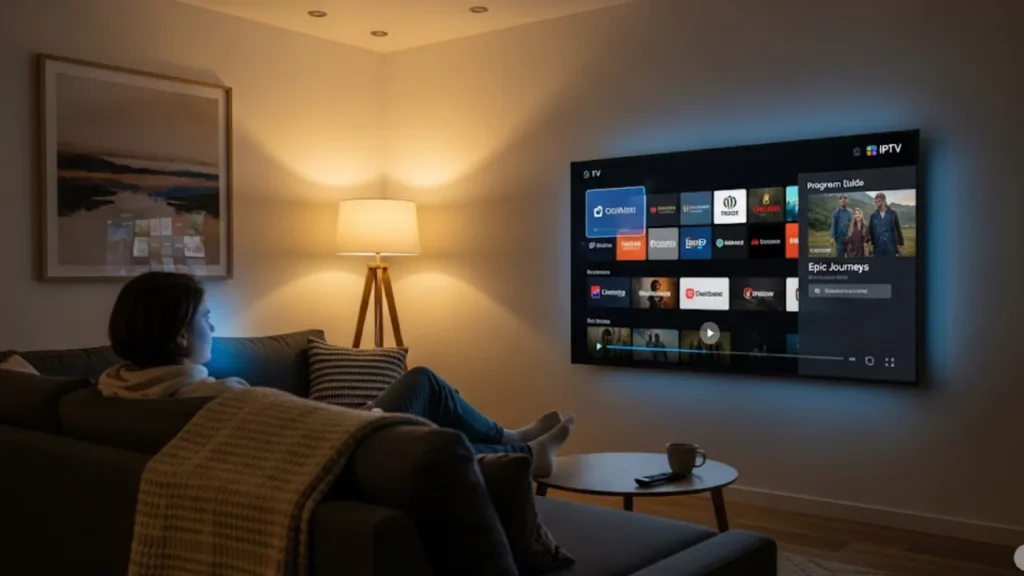Frustrated with your IPTV does not work or cutting out during your favorite show? You’re not alone. Millions of users deal with buffering, freezing, or sudden service interruptions. These issues can ruin a fun evening at home. Live sports or the latest episode of your favorite show can frustrate viewers. These issues often leave you feeling helpless and annoyed. You might find yourself searching for ways to get back to smooth streaming.
This guide shows you the best ways to get your IPTV service working well again. This may save you time and reduce frustration.
Most IPTV issues happen due to slow internet, outdated apps, or subscription problems. Start by checking your internet speed and restarting your device. Clear the app cache or switch to a wired Ethernet connection for more stability. If problems continue, update your IPTV app or check if your subscription is active. These quick fixes solve most IPTV problems in minutes and restore smooth streaming.
Understanding IPTV and Its Functionality
IPTV (net Protocol tv) provides television content material thru your internet connection. This is different from the usual cable or satellite options. Your IPTV device gets streaming data from your provider’s servers. It changes this data into content you can watch on your Smart TV, Fire TV, Apple TV, or other streaming devices.
The system relies heavily on stable network connectivity and proper content delivery systems. If any part of this chain fails, you might see buffering, black screens, or channels that won’t load. Understanding this basic functionality helps identify where problems might occur.
What Causes IPTV Performance Issues?
Buffering Problems
IPTV buffering happens when your streaming device can’t handle the data from your IPTV provider. This causes annoying pauses while playing videos. You notice it more when you have 4K content or are busy with your internet service provider.
Your internet speed plays a crucial role here. Maximum IPTV apps require at the least 25 Mbps for HD content and 50 Mbps for 4K streaming. If multiple devices share your connection, speed drops become more likely.
Freezing and Lagging
Video freezing is not the same as buffering. Freezing halts playback entirely, but buffering pauses it. This usually means your IPTV provider is busy, or you have network problems.
Lagging manifests as delayed audio, choppy video, or synchronization issues. These symptoms usually mean your streaming device can’t keep up or your bandwidth is too low.
Subscription Issues
- Login issues and service outages are common problems for IPTV users.
- Users often encounter problems. These may be expired subscriptions, bad M3U URLs, or provider authentication system updates.
- Overlooking subscription renewal dates often leads to unexpected service interruptions.
- If you can’t log in with the correct details, contact your provider’s support team for help.
Software-Related Problems
Outdated IPTV apps, like IPTV Smarters and Stella IPTV, can cause problems. They often don’t work well with newer operating systems. These issues show up as app crashes, longer loading times, or the app not launching at all.
App cache accumulation can also degrade streaming quality over time. Clear your cache often. This helps your streaming devices run smoothly. It works for both Android tv and Amazon fireplace tv Stick.
ISP Restrictions
Internet carrier vendors (ISPs) frequently slow down or block IPTV visitors. They focus on video streaming protocols that use a lot of bandwidth. This can cause slower speeds, buffering, or loss of service for IPTV users. Some channels or programs might be blocked based on where you are. Content providers set these geographic limits. Many use DNS changes or VPNs to fix these problems. This lets them get around restrictions and regain full IPTV access. It does this by hiding their location or rerouting traffic.
Common Causes Behind IPTV Troubles?
Slow or Unstable Internet Connection
Your internet connection forms the muse of reliable IPTV performance. Inconsistent speeds, packet loss, and high latency affect streaming quality. This can result in interruptions.
WiFi signals can change. This happens when devices interfere, you’re far from the router, or walls block the signal. These variations create the perfect conditions for buffering and connection drops.
IPTV Network Congestion

Peak viewing hours stress IPTV providers. This causes server congestion and lowers streaming quality. This affects all users simultaneously, creating widespread performance issues.
Content delivery networks might slow down when a lot of users access popular channels or events. Your streaming experience suffers regardless of your local internet speed during these periods.
Outdated Software or Firmware
Streaming devices and IPTV apps require regular updates to maintain compatibility and security. Using old firmware on set-top boxes, Smart TVs, or streaming devices can cause issues.
These updates usually contain key bug fixes and performance boosts. They aim to improve streaming quality and cut down on technical problems.
Expired Subscription
Subscription lapses immediately terminate IPTV access, though some providers offer grace periods. Automatic renewal failures due to expired payment methods commonly cause unexpected service interruptions.
Check your subscription status before tackling technical issues. This quick step can save you a lot of time and effort.
ISP Blocking or Throttling
Internet providers may implement traffic shaping policies that specifically target streaming protocols. These restrictions aim to manage network congestion but negatively impact legitimate IPTV usage.
Deep packet inspection lets ISPs spot and slow down IPTV traffic. This creates fake speed limits during busy times or peak hours.
How to Fix Common IPTV Problems?
Improving Internet Connectivity
Switch to wired connections whenever possible for maximum stability and speed. An Ethernet cable gives steady bandwidth and avoids WiFi issues. This significantly boosts your streaming experience.
If wireless is necessary, connect to 5 GHz WiFi networks rather than 2.4 GHz alternatives. Pass your streaming device toward the router. Also, clear any objects in the way.
- Take a look at your net pace often the use of pace test equipment
- Upgrade your internet plan if speeds consistently fall below requirements
- Contact your internet provider about persistent connectivity issues
- Consider installing an Ethernet connection for dedicated streaming areas.
Utilizing VPN to Reduce Buffering
VPN services can bypass ISP throttling and improve routing paths to IPTV servers. Choose providers that have a kill switch and innovative mode features for streaming.
Connect to VPN servers near your IPTV issuer’s place. This helps boost performance. This reduces latency while maintaining the benefits of encrypted traffic routing.
Updating Software and Firmware
- Check for streaming device firmware updates in system settings.
- Update all IPTV apps through their respective app stores.
Regular maintenance prevents compatibility issues and ensures access to the latest performance improvements. Enable automatic updates when available to streamline this process.
Clearing Cache and Data
Cache clearing removes temporary files that can slow down IPTV apps over time. This simple maintenance task often resolves mysterious performance degradations and loading problems.
Go to your streaming device’s app management section. Then, clear the cache for all IPTV apps. This method modifications primarily based on the tool kind. Usually, you go to settings and then to application management.
Checking and Renewing Subscriptions
Verify subscription popularity via your IPTV company’s website or customer portal. Ensure payment methods remain current and automatic renewal settings are correctly configured.
Contact the provider support immediately when subscription issues persist despite valid payment information. Documentation of subscription details expedites resolution processes.
Why Won’t My IPTV Troubleshoot Properly?
Restarting Devices and Routers
The system restart resolves many temporary glitches that affect IPTV performance. Restart your streaming device, router, and modem one by one. Wait 30 seconds after each restart.
This process frees up memory and refreshes network connections. It usually solves communication problems between your IPTV device and the provider’s servers.
App and Device Troubleshooting
- Uninstall problematic IPTV apps to remove corrupted installation files.
- Reinstall the apps to restore functionality.
- Use this as a last resort if other troubleshooting methods fail.
Factory reset your streaming box only if necessary. This will erase all settings, so you must set up everything again.
Exploring Alternative Streaming Options
Consider backup streaming services when primary IPTV providers experience extended outages. Having alternatives prevents complete entertainment interruption during technical difficulties.
Research multiple IPTV providers in your area to identify reliable alternatives. This preparation proves invaluable during service disruptions or when switching providers becomes necessary.
Pro Tips for Optimal IPTV Performance
Maintain dedicated bandwidth for IPTV by limiting other internet activities during viewing sessions. Pause downloads, updates, and streaming on different devices. This will free up bandwidth for your primary viewing device.
Document troubleshooting steps that successfully resolve your specific issues. This article helps you save time when problems arise. It also shows patterns that need lasting solutions.
Final Thoughts for Better Streaming
If IPTV does not work, it requires patience and a systematic approach to identify root causes. Most issues resolve through basic connectivity improvements, software updates, or simple device restarts.
Remember that persistent problems often indicate underlying infrastructure issues requiring professional intervention. If troubleshooting doesn’t work, contact your internet and IPTV providers for help.
Frequently Asked Questions
Why is my IPTV not working?
IPTV may not work due to server issues, a poor internet connection, or an expired subscription.
How do I fix IPTV buffering?
Check your internet speed, use a wired connection or VPN, and clear your IPTV app cache.
Why does my IPTV freeze on TV?
Freezing often happens due to weak internet, overloaded servers, or outdated IPTV apps.
How can I get IPTV to work again?
Restart your device. Update the IPTV app. Check your subscription status. Also, switch to a stable server.
Why is my IPTV channel not showing?
This usually means the channel link is down. It could be that the provider removed it, or the playlist needs refreshing.


